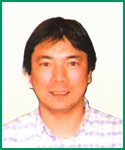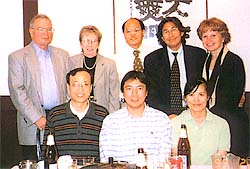  |
 |
 |

|
Notes on Study in the U.S.
| Dr. Ryoji Morita |
| Staff Scientist,Laboratory for Neurogenetics |
|
 |
I had the opportunity to conduct related research at UCLA for one year starting from December of 1998. The purpose of my stay at UCLA was to promote an ongoing joint research project under the direction of Dr. Delgado- Escueta, Professor of Neurology, and also to acquire new genetic analysis techniques. The aims of the collaborative work included isolating genes responsible for causing hereditary epilepsy, elucidating the gene locus through statistical approaches following genotyping that makes use of epileptic genealogies, and finally elucidating the developmental mechanism of epilepsy by identifying mutant genes linked with epilepsy phenotype. In addition Prof. Delgado-Escueta is a true pioneer in the field of epileptic research and was quick to introduce genetic methodologies. Prof. Delgado-Escueta is a very energetic and active man and handles a wide range of activities, which include making diagnoses for and treating his patients, as well as providing guidance to the residents and managing various laboratories.
Fully aware of the above, I believed that this was a golden opportunity for me to conduct studies under the direction of such a talented person. I left for America full of hope, gladly accepting the offer proposed by the Head, Dr. Kazuhiro Yamakawa. I had previously met Prof. Delgado-Escueta on several occasions and knew him to be a discerning, cool-headed man of gentle nature, so I was not anxious at all before I left. Prior to my arrival, I had expected to see at least four or five researchers busily promoting their studies in the laboratory. However, contrary to my expectations, there were only two: a Chinese researcher, Dr. Bai, who had just arrived at the laboratory one month before I did, and a part-time researcher who worked there three days a week. The other researchers had already returned back to their home countries several months beforehand upon finishing their period of study abroad. I felt a bit discouraged when I discovered such circumstances since the other purpose of my stay at UCLA was to improve my English ability through discussions. I was worried that it would not improve as much as I had expected.
However, this was the only anxiety I experienced during my stay, and as for the research itself, there were not any problems at all. More than 2,000 blood samples were collected from epileptic genealogies from all over the world, and a large volume of clinical data was compiled describing the detailed results. The data was then analyzed by Prof. Delgado-Escueta himself, as well as by other medical doctors under his guidance. He told me that he regarded this myriad of samples and data as a kind of "treasure" and actually confessed that for a period of 10 years he had gone to Central and South America, Europe, the Middle East and India by himself (sometimes with money out of his own pocket) in order to collect this "treasure". His efforts and conviction are truly worth admiration, and thanks to his many years of endeavor the laboratory was able to identify four specific chromosomal loci for epilepsy. And they isolated the EPM2A gene, which is mutated in recessive type of progressive myoclonus epilepsy patiens, from one of four chlomosomal loci the year before last. (our Laboratory is currently carrying out functional analyses on this gene).
The research in U.S. went quite smoothly as a result of Prof. Delgado- Escueta's mountain of "treasure". He also willingly provided me with some additional samples necessary for our future studies here at RIKEN. In addition to this, the professor held laboratory meetings for us once a week at UCLA despite the fact that he was busy giving clinical lectures. At times he would spend up to two hours carefully listening to us and instructing us on how to examine and analyze the data in plain and easy to understand English.
Dr. Bai and I, who were both studying abroad away from our families, were also invited to go out to eat and to attend parties on many occasions. However, looking back on those days now that I have returned to Japan, the one thing that I treasure most is the time I was able to spend with Prof. Delgado-Escueta, as I could withness first hand his truly amicable nature and his dedicated and driven attitude towards research.
|
|
The other day a certain newspaper reported sayings from the manager of the Hanshin Tigers, one of the Japanese baseball team, Mr. Katsuya Nomura, was widely discussed last year. One of the sayings goes something like this, "Open your eyes wide and enhance your insight so that you may see even the minutest of details". This saying reminds me a great deal of Prof. Delgado-Escueta, and taking these words to heart, I plan to fully devote myself to my research as we mark the beginning of the 21st century.
|

|
Prof. Delgado-Escueta (2nd person from top right),
His wife Susan (top right end),
Dr. Bai (bottom left end),
Myself (bottom center)
|
|
 |
 |
 |
|
|






